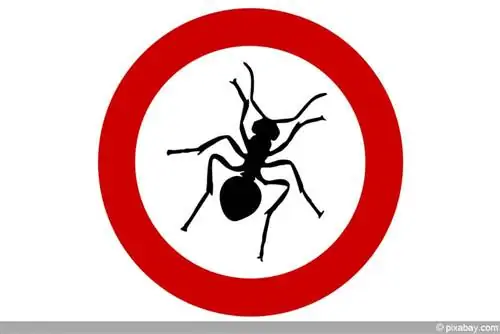- Author admin caroline@plants-knowledge.com.
- Public 2023-12-17 03:39.
- Last modified 2025-06-01 06:48.
If hordes of ants boldly march into the house, they are following an involuntary invitation from the residents. Anyone who resorts to chemical insecticide in a panic underestimates the intelligence of the disciplined, excellently organized insect community. Only when you get to the root of the problem and eliminate the causes will you be able to get rid of the pests again. This guide explains which weak points make your house vulnerable to ants and lists 10 effective means of ecological control.
Causes
- This attracts ants into the house -
Those who view ants as pests overlook their important role in the ecosystem. Even a single forest ant colony preys on up to 120,000 invertebrates every day, including numerous plant-eating pests that make life difficult for home gardeners. In addition, ants act as he alth police in fields, forests and gardens by consuming carrion and cleaning the birds' feathers of parasites. Unfortunately, these busy crawling creatures also have a soft spot for our food, so they briskly use every opportunity to break into the house and help themselves to the supplies. This is not only annoying, but can be harmful to he alth as food can be contaminated and pathogens can be transmitted.
Before you fight an acute infestation of ants in the house, we recommend a detailed analysis of the causes. Only when you know exactly why the insects have chosen your home for bold predation will you achieve lasting control success. We have compiled the most common triggers for an ant problem in the house with tips for effective countermeasures for you below:
Open food storage
Freely accessible food and supplies have emerged as the main cause of an ant infestation in the house. The insects have a keen sense of smell, which shows them the way even from a great distance. First of all, there are individual scouts that you hardly notice. The spies use scents to mark the path for the rest of the population, whereupon the dreaded ant trails form in the house, aimed precisely at your kitchen, the pantry and other locations of food and feed.
What to do:
- Do not leave food open until consumed
- Store supplies in airtight containers or plastic bags
- Wash used dishes as quickly as possible or put them in the dishwasher
- Empty and clean pet food bowls promptly
- Remove food residues on the floor immediately and wipe the area wet
Unlocked waste containers in the house and garden
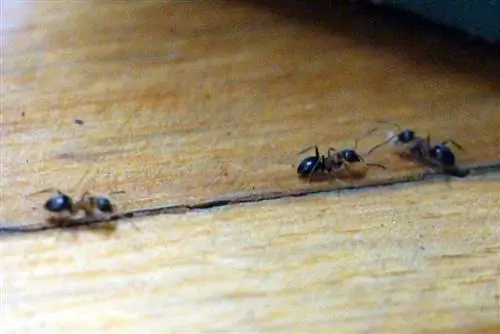
What we consider to be waste has a magical attraction for ants. This applies to all kinds of organic materials left over in the house and garden. Leftover food and kitchen waste are on the ant colony's menu, as is a large proportion of compostable garden waste. This is where the ant workers' unerring sense of smell comes into play, which they use to target your home.
What to do:
- Use a trash can with a lid in the kitchen and empty it daily
- Procure lockable bins for residual waste and organic waste
- Create a compost heap far away from the house
- Alternatively, compost garden and vegetable waste in a closed bin
Tip:
Lockable garbage cans keep a lot of nuisances away from the house. These include blowflies, rats, martens, raccoons and other animals that roam around residential areas on the lookout for prey and are not afraid to break into your home.
Gaps in joints and walls
Tightly closed doors and windows won't stop clever ants from invading your home. Their small body size allows the insects to use the smallest gaps in the masonry as a hiding place. Tiny openings in joints do not go unnoticed by the agile Hymenoptera.
What to do:
- Close holes in joints and walls with silicone, acrylic or construction foam
- Seal windows and doors with self-adhesive draft excluder seal
Unsuitable living space climate
Ants love a warm, humid climate. If you want to offer the most uncomfortable conditions in your house for the approaching scouts, fresh, airy rooms are an effective solution.
What to do:
- In spring and summer, ventilate living rooms several times a day for a few minutes
- Ideally equip the kitchen and pantry rooms with an air conditioning unit in summer
Aphid infestation on houseplants
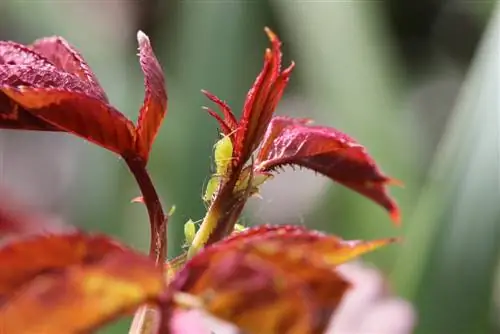
If you can rule out all the causes of the ant infestation explained so far, your houseplants will become the focus. If aphids have settled on the top and bottom of leaves or along shoots, the pests exert an intense attraction on ants. Lice ingest plant sap and excrete sweet honeydew as a waste product. Since ants are crazy about all kinds of sweets, they come in droves to harvest the honeydew. The clever insects go so far as to relocate aphids from an overpopulated plant in order to optimize the yield of honeydew.
What to do:
- Check houseplants regularly for aphids
- Combat an infestation immediately with the classic soft soap solution
- Quarantine affected houseplants outside the house during the control process
10 effective remedies from kitchen and nature
Eliminating the causes mentioned does little to combat the current ant infestation. Communication in the ant colony works so perfectly that your house remains in the collective consciousness of the insects as a worthwhile destination, at least for some time. In order to finally end the invasion, the focus is on the following effective means that do not contain chemical toxins.
Essential Fragrances
Use essential scents to use your sensitive sense of smell to beat ants at their own game. By spreading the following strongly scented substances on the streets and at suspicious entry points, you create an invisible barrier for the nuisances:
- Lemon slices studded with cloves
- Crushed fresh mint leaves or dried peppermint leaves
- Drop clove, lavender or eucalyptus oil onto paper strips and distribute
- Lay out juniper, chervil, thyme and fern in small bundles
Storage containers with sugar, flour or paprika powder are loved by ants. Place a few bay leaves in each pot and close the container with a lid. The delicate ants' noses don't like the spicy smell, so they avoid it despite the tempting content.
Dust and powder as effective traveling barriers
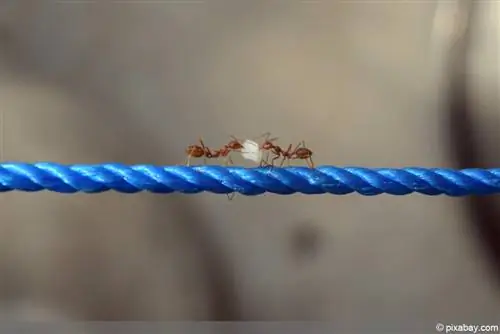
Dusty surfaces deter ants because they don't like walking over the small-grain material. Sprinkle all possible infested areas in and in front of the house with the following products to increase the inhibition threshold for scouts and the entire infantry:
- Draw thick chalk lines and refresh regularly
- Sprinkle rock dust or charcoal powder
- Sprinkle cheap baby powder from the discount store
However, as a sole means of combating ants, this strategy lacks the necessary effectiveness. In conjunction with other ecological means, the traveling barrier method helps to noticeably reduce the infestation pressure.
Disgusting smells from the spice cabinet and herb bed
There are many spices on the kitchen shelf that have proven to be effective against ants in the house. Some plants also thrive in the herb bed, whose scent curbs an invasion of insects in advance. The following remedies prove to be particularly effective when used in different combinations:
- Sprinkle cinnamon, black pepper, chili powder directly onto the walkways
- Crush the garlic cloves and lay them out on window sills
- Distribute crushed cloves in the kitchen, pantry and garbage cans
The effectiveness of grated turmeric root or ginger powder against ants is controversial. Proponents are convinced that the Asian plant is effective against ant infestations. The other side swears that the insects are attracted to the spice.
Tea tree oil-water mixture
Highly concentrated tea tree oil has established itself as an effective repellent against ants. It is not advisable to use it undiluted as the intense smell irritates human mucous membranes. By dissolving the oil, it turns into a natural ant control agent in the house. Fill a 1-liter spray bottle with warm water and 5 to 10 drops of tea tree oil. Add a splash of dishwashing liquid as an emulsifier so that both liquids mix well. Distribute the spray you make yourself regularly to all areas that are colonized by ants. As with most ecological means, in this case too, the control success only becomes apparent after some time.
Camphor-alcohol mix
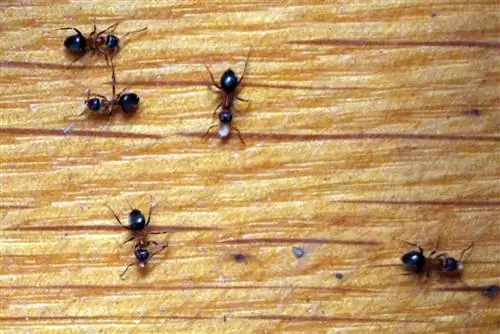
Camphor not only relieves pain and cold symptoms. The medicinal plant also relieves you of an ant infestation. If all strategies for deterring them fail, use the following mix to kill the insects:
- Purchase 1 small bottle of camphor at the pharmacy
- Dilute camphor with alcohol in a ratio of 1:10
- Pour into a flower syringe and spray directly onto the ants
Tip:
Numerous insect sprays are based on the active ingredient permethrin. Although the substance is obtained from the flowers of chrysanthemums, it is still a synthetic toxin. If permethrin enters your organism in elevated concentrations through the air you breathe or through your skin, neurotoxic poisoning can occur. Symptoms range from itchy skin to nausea, dizziness, headaches, hearing and vision problems.
Beer Honey Trap
If hardened hordes of ants prove to be immune to all repellents, put an end to the plague with the classic beer-honey trap. Pour stale beer into a shallow bowl and stir in a teaspoon of honey. Their sweet tooth will now be the troublemakers' downfall. Attracted by the sweet smell of honey, the ants fall into the liquid and drown. Although this trap also works with other liquids, the alcohol content in the beer has an amplifying effect on its effectiveness.
Coffee grounds
Coffee grounds have a double impact on ants. On the one hand, the insects can't stand the smell, so it can be used as a fragrant barrier. Furthermore, caffeine is toxic to the ant organism even in small amounts. Therefore, collect coffee grounds from the filter and let them dry. Scattered on streets, in front of windows and doors, the aroma wards off the approaching armada. If the smell subsides over time, the workers drag coffee grains into the nest as food reserves. If ants and their brood eat it, the population in your house will decrease significantly after a while.
Vinegar and vinegar essence
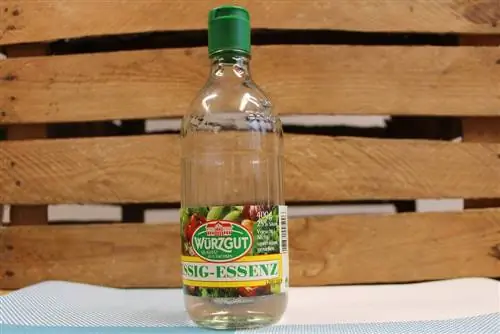
In the long term, vinegar has the potential to destroy an entire ant colony. Wipe the floor and all work surfaces in the kitchen with vinegar or vinegar essence several times a day. Fill a spray bottle with vinegar water and treat window sills inside and out, including all possible access points, with the liquid. In this way you destroy the scents that ants use to orient themselves. The workers are then so confused that they can neither find the way to the pantry nor the way to the nest. Ultimately, the colony, brood and queen die due to a lack of food supplies.
Diatomaceous earth
Diatomaceous earth is making a name for itself in the range of ecological control agents against ants. This is natural sedimentary rock that was formed from fossil diatoms. Diatomaceous earth is available from specialist retailers as a powder and is known, among other things, as diatomaceous earth or mountain flour. Use a brush or a powder syringe to sprinkle the rock powder directly onto the ants. The bodies then dry out because diatoms pierce the ants' protective layer. As a preventive measure, spread diatomaceous earth wherever ants can come into contact with the substance, such as on walkways, behind kitchen cabinets or skirting boards.
Baking powder/baking soda
The most well-known, deadly remedy against ants is in every kitchen cupboard. The main ingredient in baking powder is sodium hydrogen carbonate - baking soda for short. When ants eat it, the substance changes the pH value in their organism, causing the insects to die. This effect was demonstrated in a scientific experiment at the University of Georgia. To ensure that ants eat the baking soda, do this:
- Mix baking soda and powdered sugar in a ratio of 1:1
- Spread the product on the infested areas and ant trails
- Refresh the grit regularly
Workers who consume the baking powder on site immediately die. The majority of ants carry baking soda and powdered sugar into the nest to feed to the queen and brood. Ultimately, the entire ant colony is doomed. For effectiveness, it is important to note that it is actually sodium bicarbonate. Various manufacturers of baking powder now use cheaper potassium hydrogen carbonate, which has a similar baking power, but is ineffective as an anti-ant control agent in the house.

